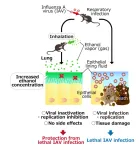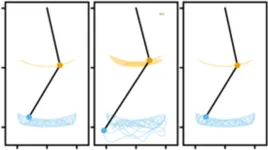(Press-News.org) A new paper in FEMS Yeast Research, published by Oxford University Press, reveals the possible origin story of lager beers. Using historical records and contemporary phylogenomics research, investigators here show where lagers likely first originated: at the court brewery (Hofbräuhaus) of Maximilian the Great, elector of Bavaria, in Munich in 1602.
Beer has been made since ancient times. Recent archaeology shows evidence of brewing in the eastern Mediterranean some 13,000 years ago. Although from the origins of brewing until the early 20th century, ale was the typical beer produced, lager now accounts for approximately 90% of the beer consumed annually.
The beginnings of this shift from ale to yeast occurred when a new yeast species, Saccharomyces pastorianus or “lager yeast,” appeared in Germany around the end of the middle ages. This is a hybrid species that arose from mating the top-fermenting ale yeast Saccharomyces cerevisiae and the cold-tolerant Saccharomyces eubayanus around the start of the 17th century. But until now no one has figured out how the combination lager yeast S. pastorianus came about.
The general assumption was that the hybrid arose when a traditional S. cerevisiae ale fermentation became contaminated with wild yeasts including S. eubayanus. But the researchers here believe this is doubtful. Using a detailed analysis of Central European historical brewing records, they discovered that “lager-style” bottom fermentation was happening in Bavaria from at least two hundred years earlier.
They propose an alternative hypothesis that it was S. cerevisiae that contaminated a batch of beer brewed with S. eubayanus, rather than the other way around. And in an intriguing piece of detective work, they identified what they believe to be the source of the contaminating S. cerevisiae – a wheat brewery in the small Bavarian town of Schwarzach.
Beer was always a valuable commodity and its production was regulated carefully. In Bavaria a brewing ordnance from 1516 (the famous “reinheitsgebot”) permitted only bottom fermentation and brewing of “lager-style” beer. But in neighboring Bohemia, excellent wheat beer made with S. cerevisiae was produced and vast quantities were imported into Bavaria. To limit the economic damage from these imports, in 1548 the Bavarian ruler, Wilhelm IV gave Baron Hans VI von Degenberg a special privilege to brew and sell wheat beer in the border regions to Bohemia.
When the grandson of Hans von Degenberg failed to produce an heir, the family finally died out and, in 1602, the new Bavarian ruler, Maximilian the Great, seized the special wheat beer privilege himself and took over the over the von Degenbergs’ Schwarzach breweries. In October of that year, the yeast from the wheat brewery was brought to the Duke’s court brewery in Munich, where the researchers propose the famous hybridization took place and S. pastorianus was born. After that, the researchers here show, S. pastorianus strains from Bavaria spread all over Europe and are the source of all modern lager yeast strains.
The results of the researchers’ investigation of the historical record, together with published phylogenomic (evolution and genomics) data, suggest that the dominance of S. pastorianus lager yeast developed in three stages. First, the yeast strain S. cerevisiae came to Munich from Bohemia, where brewers had made wheat beer since at least the 14th century. Second, the S. cerevisiae that was introduced into the Munich brewery in 1602 mated with S, eubayanus, which was already involved in making Munich-style beer, to give rise to S. pastorianus. And finally, the new S. pastorianus yeast was distributed around Munich breweries first, and then throughout Europe and the world. The researchers here note that the co-occurrence of S. pastorianus with the technologically advanced brewing methods in Munich, and the willingness of Munich brewers to share knowledge (and actual yeast) may have contributed to the strain’s dominance.
“There is a certain irony that the inability of Hans VIII von Degenberg to produce a son triggered the events that led to the creation of creation of lager yeast, said Mathias Hutzler, one of the paper’s lead authors. “As one lineage died out, another began. No heir - but what a legacy he left for the world!”
The paper, “A new hypothesis for the origin of the lager yeast Saccharomyces pastorianus,” is available (at midnight EST on April 27th) at: https://academic.oup.com/femsyr/article-lookup/doi/10.1093/femsyr/foad023.
Direct correspondence to:
Mathias Hutzler
Weihenstephan Research Center for Brewing and Food Quality
Technical University of Munich
Alte Akademie 3, 85354 Freising, GERMANY
m.hutzler@tum.de
To request a copy of the study, please contact:
Daniel Luzer
daniel.luzer@oup.com
END
German researchers figure out how lager first developed in Bavaria
2023-04-27
ELSE PRESS RELEASES FROM THIS DATE:
Discovering hidden order in disordered crystals
2023-04-27
Researchers at Tokyo Tech have discovered hidden chemical order of the Mo and Nb atoms in disordered Ba7Nb4MoO20, by combining state-of-the-art techniques, including resonant X-ray diffraction and solid-state nuclear magnetic resonance. This study provides valuable insights into how a material’s properties, such as ionic conduction, can be heavily influenced by its hidden chemical order. These results would stimulate significant advances in materials science and engineering.
Determining the precise structure of a crystalline solid is a challenging endeavor. Materials properties ...
Claus Daniel to lead Argonne’s Advanced Energy Technologies organization
2023-04-27
The U.S. Department of Energy’s (DOE) Argonne National Laboratory has named Claus Daniel as Associate Laboratory Director for Advanced Energy Technologies (AET). He will begin his new role on Monday, May 1.
Daniel will join Argonne from Carrier Corporation, where he leads engineering partnerships and sustainability as part of Carrier’s strategy and innovation team. He manages the effort to decarbonize the product portfolio, with activities spanning 16 time zones in the U.S., Europe and Asia. Prior to joining Carrier, Daniel spent 16 years with DOE’s Oak Ridge National Laboratory (ORNL) in a number of roles.
“It is an exciting ...
Can jack-of-all-trades AI reshape medicine?
2023-04-27
The vast majority of AI models used in medicine today are “narrow specialists,” trained to perform one or two tasks, such as scanning mammograms for signs of breast cancer or detecting lung disease on chest X-rays.
But the everyday practice of medicine involves an endless array of clinical scenarios, symptom presentations, possible diagnoses, and treatment conundrums. So, if AI is to deliver on its promise to reshape clinical care, it must reflect that complexity of medicine and do so with high fidelity, says Pranav ...
Study shows children’s inactivity remains an issue in wake of pandemic
2023-04-27
New research has revealed children’s physical activity in the UK has largely returned to pre-pandemic levels – but children are still more sedentary during the week.
The study, led by the University of Bristol, found that by summer last year 41% of children were meeting the national recommended physical activity guidelines of an hour on average of moderate to vigorous physical activity daily. Although this shows an improvement from the immediate aftermath of the COVID-19 pandemic, when little more than a third (37%) were meeting this target, it means the majority of children were still ...
Inhaled ethanol may treat respiratory infections and stop pandemics
2023-04-27
Inhaling low concentrations of ethanol vapor can disable the influenza A virus in mice, without harmful side effects, says a new study by scientists at the Okinawa Institute of Science and Technology (OIST). The scientists believe it may also treat similar viruses such as the one that causes Covid-19.
Prof. Tsumoru Shintake, who leads the Quantum Wave Microscopy Unit at OIST, first proposed the idea to use ethanol vapor to treat respiratory tract infections. He set out to test the approach with his colleague, Prof. Hiroki Ishikawa, leader of the Immune Signal Unit at OIST, and their team members.
“Ethanol is an effective disinfectant ...
Air-breathing cathode enhances energy conversion efficiency and durability of alkaline nickel-zinc batteries
2023-04-27
Nickel-zinc (Ni-Zn) batteries are promising due to their high output voltage, high theoretical specific energy, high safety, and low cost. However, rechargeable alkaline Ni-Zn batteries are challenging, since the cathodic side reaction of oxygen evolution results in low energy efficiency and poor stability.
Recently, a research group led by Prof. YANG Weishen and Dr. ZHU Kaiyue from the Dalian Institute of Chemical Physics (DICP) of the Chinese Academy of Sciences proposed ...
Methanol biotransformation to efficiently produce fatty alcohols
2023-04-27
Methanol is a potential feedstock for biomanufacturing since it's easily obtained in an environment-friendly manner. But it is still challenging to construct a microbial cell factory for methanol-based bioproduction due to the toxicity of methanol and complex cellular metabolism.
Recently, a research group led by Prof. ZHOU Yongjin from the Dalian Institute of Chemical Physics (DICP) of the Chinese Academy of Sciences (CAS) has engineered yeast Ogataea polymorpha for efficient ...
Duke-NUS, IMH: Cost of anxiety and depression in Singapore runs into the billions
2023-04-27
SINGAPORE, 26 April 2023 – Symptoms of anxiety and depression in the post-peak pandemic era could be costing Singapore 2.9 per cent of its gross domestic product (GDP)—or nearly S$16 billion—suggests a study conducted by Duke-NUS Medical School and the Institute of Mental Health (IMH).
Publishing in the journal BMC Psychiatry, the researchers estimated the total economic burden of lost productivity due to anxiety and depression in Singapore to be S$15.7 billion (US$11.72 billion) annually, based on survey data from 5,725 Singaporean adults collected via an online panel between April and June 2022.
Using ...
Maths unlocks molecular interactions that open window to how life evolved
2023-04-27
Dr Araujo, from the QUT School of Mathematical Sciences, said the research findings represented a blueprint for adaptation-capable signalling networks across all domains of life and for the design of synthetic biosystems.
“Our study considers a process called robust perfect adaptation (RPA) whereby biological systems, from individual cells to entire organisms, maintain important molecules within narrow concentration ranges despite continually being bombarded with disturbances to the system,” Dr Araujo ...
The conservation laws of a dynamical system are no mystery to artificial intelligence
2023-04-27
Osaka, Japan – Many real-world systems, from climate systems to the physical mechanisms of robots, are governed by the invariant quantities that arise from their underlying geometric structures. Modelling these systems using computer simulations is a key tool for understanding them (for weather forecasting, for instance, or developing robot locomotion). It’s often possible to collect data for these systems, but making sense of those data to build a model is a more challenging task.
Artificial intelligence ...



